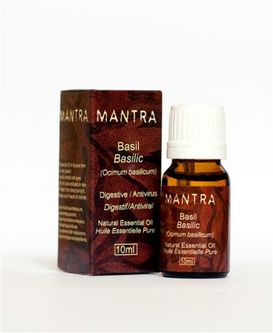

Basil - Basilic (Ocimum basilicum) 
There are more than 100 varieties of the herb Basil (Tulsi). The common variety has dark green leaves, which if bruised yeild a very aromatic scent. The plant is often known as the royal herb. Basil originates from India. Basil was recommended by Pliny, (23 - 79 AD) the Roman writer in the Encyclopedic Natural History, against jaundice and epilepsy and as a diuretic. In the middle ages it was prescribed for melancholy and depression.
The essential oil: The oil is yellow and it is very aromatic. The principal constituents include camphor, cineol, eugenol, linalool and pinene, but all vary in proportion according to the plant
Properties: Antispasmodic, Digestive ,Antiviral ,Sedative
Directions: Antiseptic (digestive), Facilitates digestion, Combats cramps and spasms, Aids circulation and Nervous system, Headaches (migraines)
External Use: - Aids the nervous system: Gently Massage 3 drops (diluted) on the solar plexus, neck and spine.
- Digestive system: 3 drops diluted for massage on the abdomen.
Baths: To be used For a massage or a relaxing bath.
Helps in overcoming, anxiety, and nervousness, physical and intellectual asthenia.
Pour 20 ml of essential oil of basil in 250 ml of almond oil or safflower oil.
Use as massage oil or bath.
Synergy: Relaxing anti-stress: 1drop Peppermint, 2 drops Chamomile, 2drops Neroli, 1 drop Basil, diluted in Jojoba oil in massage.
Specialties: Oil is very potent. Do not use undiluted on skin, dilute in vegetable oil. Avoid use during pregnancy, and for young children.
Caution: Keep out of reach of children. Some oils are prohibited to pregnant women and children. Keep away from flame.

There are more than 100 varieties of the herb Basil (Tulsi). The common variety has dark green leaves, which if bruised yeild a very aromatic scent. The plant is often known as the royal herb. Basil originates from India. Basil was recommended by Pliny, (23 - 79 AD) the Roman writer in the Encyclopedic Natural History, against jaundice and epilepsy and as a diuretic. In the middle ages it was prescribed for melancholy and depression.
The essential oil: The oil is yellow and it is very aromatic. The principal constituents include camphor, cineol, eugenol, linalool and pinene, but all vary in proportion according to the plant
Properties: Antispasmodic, Digestive ,Antiviral ,Sedative
Directions: Antiseptic (digestive), Facilitates digestion, Combats cramps and spasms, Aids circulation and Nervous system, Headaches (migraines)
External Use: - Aids the nervous system: Gently Massage 3 drops (diluted) on the solar plexus, neck and spine.
- Digestive system: 3 drops diluted for massage on the abdomen.
Baths: To be used For a massage or a relaxing bath.
Helps in overcoming, anxiety, and nervousness, physical and intellectual asthenia.
Pour 20 ml of essential oil of basil in 250 ml of almond oil or safflower oil.
Use as massage oil or bath.
Synergy: Relaxing anti-stress: 1drop Peppermint, 2 drops Chamomile, 2drops Neroli, 1 drop Basil, diluted in Jojoba oil in massage.
Specialties: Oil is very potent. Do not use undiluted on skin, dilute in vegetable oil. Avoid use during pregnancy, and for young children.
Caution: Keep out of reach of children. Some oils are prohibited to pregnant women and children. Keep away from flame.




